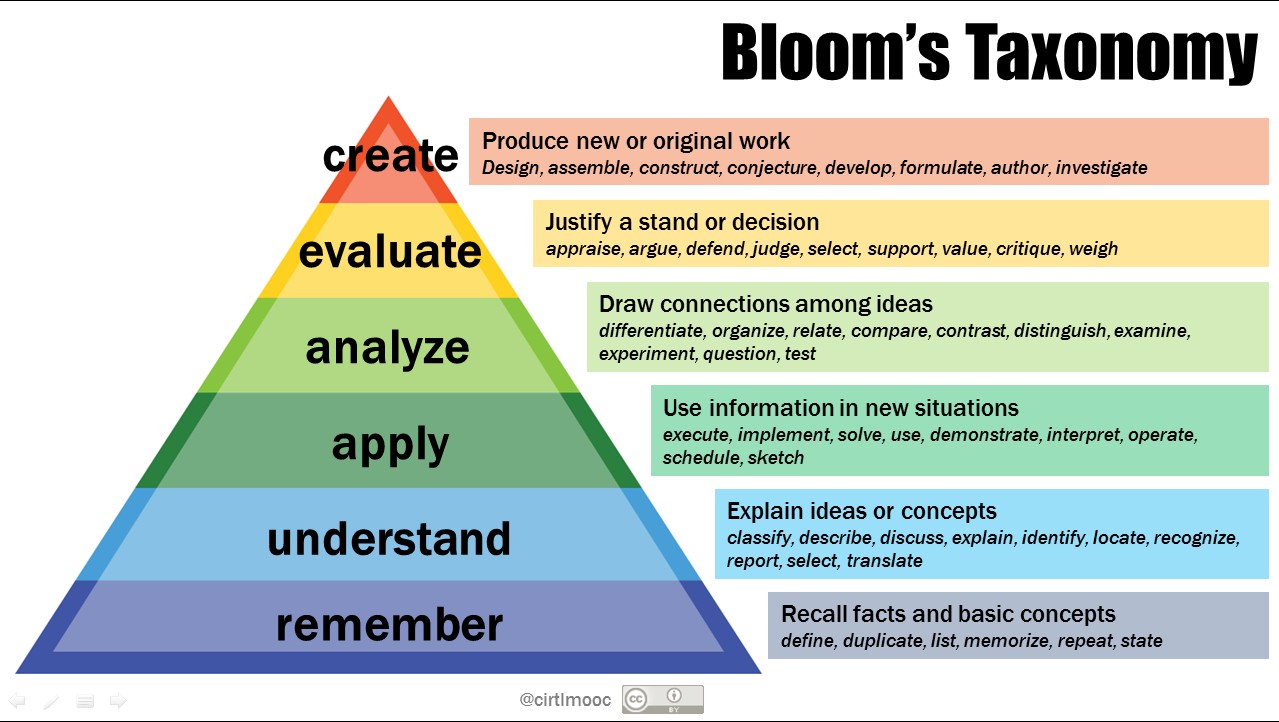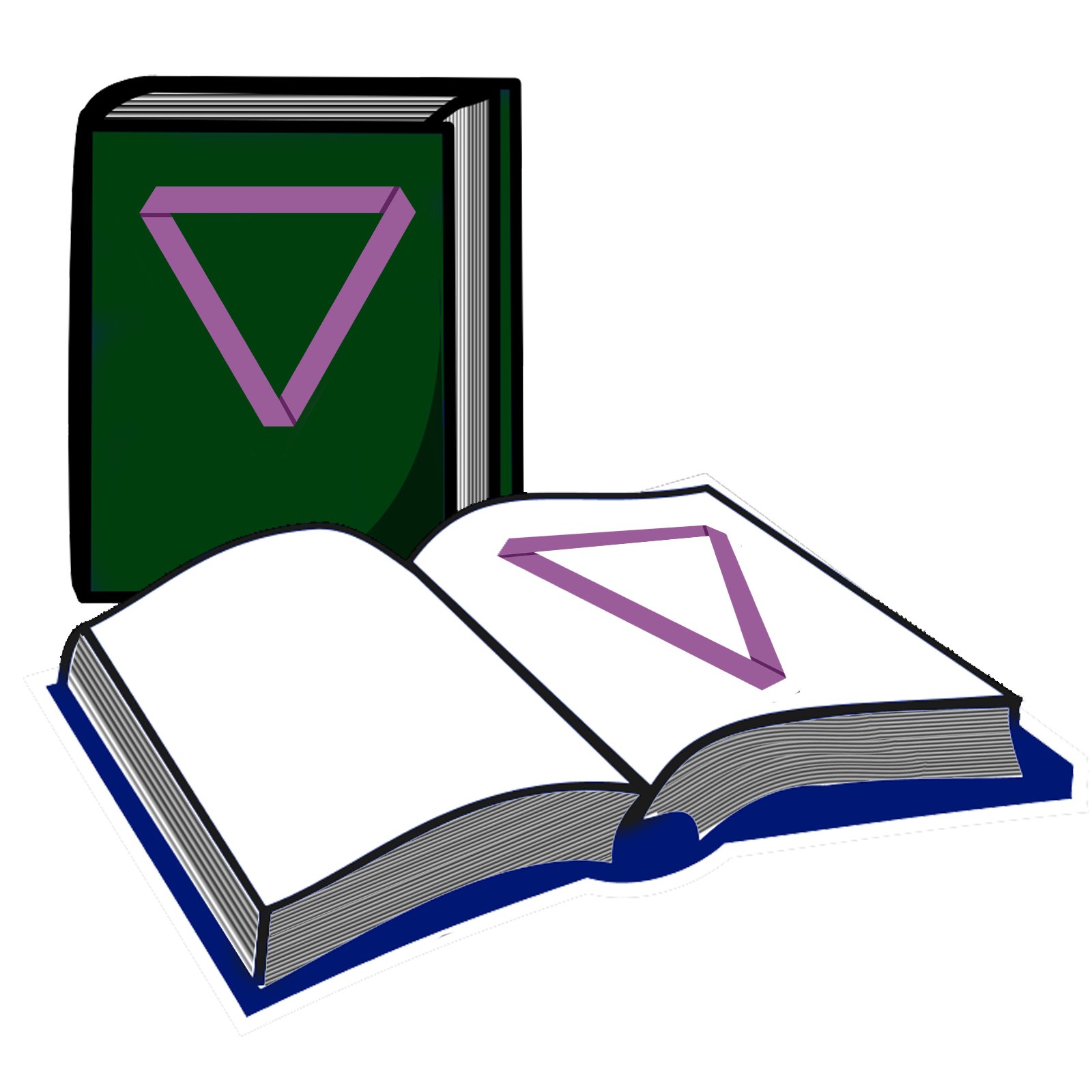- Loading...
- No images or files uploaded yet.
|
Workshop 2 LEARNING with Higher & Lower Order Thinking Skills |

8. Where on Bloom's Taxonomy did you BEGIN to SOLVE the FIRST puzzle in the middle of the paper by yourself without assistance?
9. List the higher and lower order thinking skills from Bloom's Taxonomy you used solving the other puzzles as a team.
10. Did you and your team think the puzzles were surprising or engaging, or too complex, as you helped each other solve them?
11. How do these puzzles inform your understanding about learning and how people learn?
12. Which of the six learning/thinking skills on Bloom's Taxonomy are you most often assigned in classes and which do you use least?
13. Which of these six higher and lower order thinking skills do you wish you used more in college assignments?
|
Multiple Modes of Learning

READ a Pie Chart/Graph
History of the Earth in a 24-hour Clock from the website, Flowing Data.
View
14. Do these two resources pique your curiosity or inform your understanding of the VAST lengths of time you are learning about?
Explain why or why not for EACH resource.
15. Does either of these resources make you think, "This information is interesting!"
Resources for Additional LearningNOT part of the assignment
|

https://www.ted.com/talks/derek_sivers_weird_or_just_different?language=en
blocks have names/streets do not OR streets have names/blocks do not
Bloom's Taxonomy
Bloom's Taxonomy updated with digital learning behaviors.
Digital Choice Boards
Black History MonthChoice Board (2021)
Black Lives Matter Historical Explorations Choice Board (2020)
History of the Black Press in the U.S. Choice Board (2022)
Ancient China Choice Board (2020)
Jerry Lawson
Jerry Lawson, a father of modern gaming systems used ALL TEAMS' BIG ideas to achieve knowledge, to try things, to create his radio station and gaming products.
https://www.google.com/doodles/gerald-jerry-lawsons-82nd-birthday
Dec. 1, 1940 is the birthday of one of the fathers of modern gaming and this interactive Google Doodle is both a tribute with behind the doodle information AND a way for students to play games AND program their OWN games!
https://www.youtube.com/watch?v=RLQO_RWCOoQ
Behind the doodle is what this video explains-- we see Jerry Lawson explaining what he expects new game developers to do.
https://www.npr.org/2022/12/01/1140063531/google-doodle-games-jerry-lawson
https://www.npr.org/2021/09/17/1037911107/jerry-lawson-video-game-fairchild-channel-f-black-engineer
Jerry Lawson's son and daughter describe growing up w/an inventive dad and how he helped them become engineers in these two NPR stories.
https://www.loc.gov/item/today-in-history/december-01/
Dec. 1, 1955 is the anniversary of Rosa Parks' decision to defy the Montgomery, Alabama, bus driver's order to change her seat.
Inspiring Young Writers with Making, Coding, and Digital Tools, 2019 MASSCue presentation by Torrey Trust, Robert Maloy and Sharon Edwards
Teacher Beliefs and Their Influence on Technology Use, R. Shifflet & G. Weilbacher (2015)
Despite expressing positive views about technology, teachers at all levels struggle to use technology in ways that promote student-centered learning.
Online Tools for Teaching & Learning
Site developed by students in Torrey Trust’s classes

Dr. Torrey Trust, Robert Maloy and Sharon Edwards published Kids Have All the Write Stuff Revised and Updated for a Digital Age.
Verse by Verse, Poetry Writing with Artificial Intelligence
Blackout Poems with Google Docs
Springtime Magnetic Poetry with Google Drawings
Animation
Story Creation
Comics
Creative Word Play
Story Read Aloud in Radio Reading Style
View video
![]() Watch: Digital Tools to Empower 21st Century Learners by Torrey Trust
Watch: Digital Tools to Empower 21st Century Learners by Torrey Trust
View Interdisciplinary STEAM Activities To Do at Home by Torrey Trust
Music Video
![]() Eric Idle of Monty Python's Flying Circus, takes us into theGalaxy Song
Eric Idle of Monty Python's Flying Circus, takes us into theGalaxy Song
Science Interactive
Click anywhere on the map and the wait and see what happens: https://river-runner.samlearner.com/
“I don’t see technology as an add-on, a nice option to have. It’s what enables learning and creates an environment that sparks creativity.”
--Badat
Essa Academy Headmaster

Essa Academy, England: 40 languages, poverty, 100% success
10. As a high school student, what experiences with technology were in classes for your learning?
Were these interesting to you? Please describe why they were or were not.
11. Relate Essa Academy's teaching and learning innovations to yourself as a learner.
Describe features of this teaching/learning with online resources that would have interested you and propelled your learning in high school classes that you liked to attend and classes you didn't like to attend.
Are You Smarter Than Your Smartphone? or How Much Smarter Are You with a Smartphone?
 The first smartphone was invented in 1992 and was called the Simon Personal Communicator
The first smartphone was invented in 1992 and was called the Simon Personal Communicator
It cost $899 ($1435 in today's dollars)
 People began saying the term smartphone in 1995, although it took till January 2007 for Apple to release the first iPhone at a cost of $499
People began saying the term smartphone in 1995, although it took till January 2007 for Apple to release the first iPhone at a cost of $499
Do Smartphones Make Us Smarter?
| Yes | NO |
| Bill Nye the Science Guy says that smart phones can actually make you smarter, because they help free up memory you’d normally use for mundane information, so you can use it for something else. | Rather than making us smarter, mobile devices reduce our cognitive ability in measurable ways. You are quickly conditioned to attend to lots of attention-grabbing signals, beeps and buzzes, so you jump from one task to the other and you don’t concentrate. |
Do you think the answer depends on how you use them?
Comments (0)
You don't have permission to comment on this page.